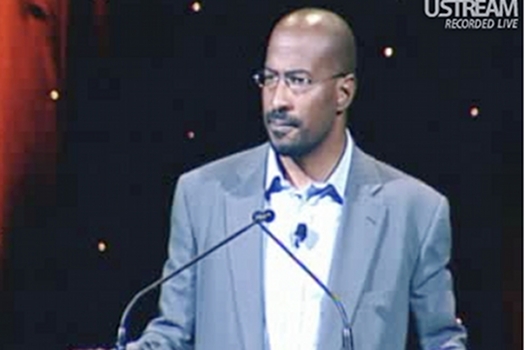When Van Jones addressed the crowd at Netroots Nation this morning, he brought one overarching message: what happened to your belief in hope and change?
But it wasn’t just a speech about why the netroots should get behind Obama rather than be part of a two-front war on his agenda. He also touched on everything from BP, the promise of America and how the conservative media can and will slime anyone — him, Shirley Sherrod or you.
Although his speech was tinged with moments of humor, satire and a call to positive action, it was in the question and answer session (which begins about 30 minutes into the below video) with Ari Melber that things really got heated.
Given that the week’s news was dominated by the story of how Andrew Breitbart used a deceivingly edited video to target and smear an African-American Obama appointee, Shirley Sherrod, in an effort to portray her as a racist and a threat to white people over whom she, as a member of the Administration, could exercise power, Melber saw some obvious parallels between Sherrod’s experience and Jones’ before he left the Administration. And, true to the Netroots Nation reputation, Melber minced no words in asking Jones to talk about how his race, and Sherrod’s, made them targets for the right-wing smear machine. Jones, however, drew distinctions between his experience and that of Sherrod’s — and then noted that, with the rise of social networking and the amount of information out there about anybody, he and Sherrod wouldn’t be the last to be targets. In fact, he expects about 15 percent of Americans to have an experience similar to his, in which something that someone else finds out about them online will impact their jobs.
Melber: The White House doesn’t want to say it, the media, most people in the media don’t want to say it. So I’ll say it. You were targeted because you’re black, because you’re progressive, and because you lived a life full of work that was creative and experimental at times, which made it easier to smear you and lie about you. We’re not here today to only focus on the past, but your experience, Ms. Sherrod’s experience, and, as Rachel Maddow put it so well this week, the experience that will continue to repeat as long as we allow it to work. What can you tell us about what people can do to fight back? And what can the media do, in your view, having lived through this in a way that very few people have to suffer through, what can the media do to actually put facts first?
Jones: Well, first of all, I think we have to recognize that we are in a new world. So that people criticize the White House, criticize the NAACP, to criticize different news outlets. We’ve never been here before. You remember that 2006 was the first election that YouTube impacted with the “macaca” incident and George Allen. We’re in a world where we’ve taken away our immune system, the old filters, the old gatekeepers, the old Walter Cronkites. We’ve banished them, but we don’t have new ones, so we’re in a situation without antibodies and so the information system has taken a huge leap forward but the wisdom system has not. The wisdom system has not.
So you can any data you want to about anybody at any time and do anything with it you want to. And people are now engineering viruses and pumping them into the body politic. And we don’t have the antibodies yet. And it will be a long process. What eventually will happen, big picture, is that 5% of the country will have an experience like mine, lose a job because of something on Facebook or something, and then 10%, and then it will be 15% and then it will stop because enough people will have seen it and enough people had it happen to them to too a friend that there will be a completely different level of wisdom that will emerge in society. That’s the long-term.
You see, you can have confidence in your country, you can confidence that we will adapt as a culture to these changes in the technology. In the short term, it will be tougher because there are financial incentives to be more shrill, to be more outrageous because there are more outlets so the people that scream the loudest will be rewarded in the short-term.
…
What I think I would say about the overall situation, though, is that this is a learning moment. And you’re right. I had a much more colorful life than Ms. Sherrod. I mean, let’s be honest: I was distinguishable as a radical leftist in the Bay Area when I was young… You’ve got to get up early, you’ve got to work weekends to be distinguishable as a leftist as a young guy in the Bay Area. So sure, it’s easy then to grab stuff and to make people think that I’m somebody who’s scary.
This woman is like Rosa Parks. This woman is as pure as the driven snow and she got slimed. And so, again, to be clear, people learned quicker. Luckily people could find the full video and audio, which wasn’t as easily available in my case, that kind of stuff, and the thing turned around fast. So we have a happy ending.
Watch the full speech below:









